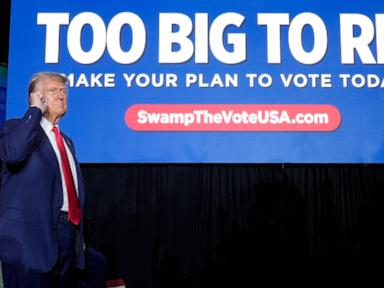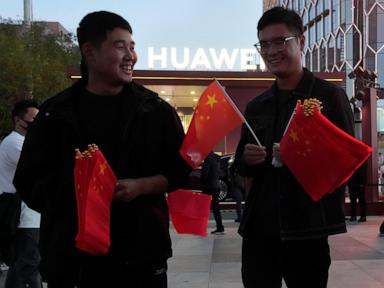China is laying the legal groundwork to seize Taiwan

Deterring a Chinese takeover of Taiwan should be a high priority for the incoming Trump administration. China has long claimed Taiwan as its own and insisted that unification is a historical inevitability. The People’s Liberation Army recently ringed Taiwan with a major military and Coast Guard exercise to demonstrate its sovereignty claim and to warn Taiwanese President Lai Ching-te against pursuing independence.
Such military operations are designed to intimidate the people of Taiwan. Ever since former Speaker of the House Nancy Pelosi visited the island in August 2022, Taiwan has faced unrelenting pressure from Chinese military operations. At the same time, Beijing has stepped up its political campaign through the U.N. and in its diplomatic relations to seek political acceptance for its claim of sovereignty over Taiwan. Even as the U.S. and many of its allies criticize these Chinese actions, they often fail to grasp the strategy behind them: Beijing is laying the legal groundwork to use force against Taiwan eventually.
During China’s display of military power in the Taiwan Strait last month, the Chinese Ministry of National Defense announced that for the first time the Chinese Coast Guard — an element of its armed forces — “conducted law enforcement patrols in the waters surrounding Taiwan.” To challenge Taiwan’s authority to control the waters around its territory, China sent three Coast Guard flotillas to conduct what it referred to as “a practical action to lawfully enforce control over Taiwan island in accordance with the one China principle.” These were the kind of law enforcement exercises that only Taiwan’s Coast Guard normally has the right to undertake, such as boarding and inspecting foreign vessels. The intent was to signal clearly China’s claim to sovereignty over the island.
A likely precursor to any use of force by Beijing will be a public assertion of sovereignty over Taiwan. By encircling the island with its law enforcement patrols and publicizing those patrols from the Ministry of National Defense, China essentially announced to the world that its campaign to control the island of Taiwan has moved to a new and more dangerous phase.
Beijing has long claimed that there is one China, Taiwan is a part of China and the Chinese Communist Party is the only legitimate government of all of China. This is Beijing’s so-called “One China principle,” which the U.S. has consistently refused to endorse.
American policy since 1950 has been that the sovereign status of Taiwan is undetermined, though it has shrouded the policy in ambiguous diplomatic language meant to smooth over differences and allow the two countries to develop stable relations. Further, American policy insists that the eventual resolution of sovereignty should be left to the people on both sides of the Taiwan Strait to peacefully decide without coercion or the threat of force.
Congress has also played a role in developing America’s Taiwan policy. The 1979 Taiwan Relations Act urges the U.S. to make defensive weapons available to Taiwan and states that Congress would consider any effort to determine the future of Taiwan by other than peaceful means, including by boycotts or embargoes, a threat to regional peace and security and of grave concern to America. Collectively, these views are known (somewhat confusingly) as America’s “One China policy.” And although the U.S. is the most vocal nation in distinguishing its policy from Beijing’s “One China principle,” other countries quietly hold similar views.
Recent Chinese Coast Guard operations challenging Taiwan’s right to control the waters around its territory pose a direct challenge to American policy and create a dilemma for all nations that desire to see Taiwan’s status be resolved peacefully and without coercion. Accepting the actions of China’s Coast Guard as lawful is to accept Beijing’s “One China principle” and to acquiesce in China’s claim that Taiwan falls under its sovereignty.
Furthermore, to accept that Taiwan is under Chinese sovereignty is to accept Beijing’s assertion that any future use of force would be a purely domestic matter — to allow the Coast Guard patrols to go unchallenged seals Taiwan’s fate. But to oppose the Chinese Coast Guard’s actions poses an open challenge to China and risks destabilizing blowback.
American policy should focus on reducing the risk of further escalation even at the cost of potential instability in the U.S.-China relationship. Accordingly, the U.S. should publicly condemn Beijing’s recent actions as destabilizing to regional peace and stability, call upon like-minded states to make similar statements, and reinforce the American commitment to a peaceful resolution by advancing Taiwan’s capacity to defend itself and our own capacity to support its defense, if necessary.
Similarly, it is time for the U.S. to actively and publicly counter Beijing’s political campaign in the United Nations and elsewhere, through which it distorts the meaning of U.N. General Assembly Resolution 2758. The official record shows that in passing the resolution in 1971, countries intended only to transfer the China seat in the General Assembly and the Security Council from the Republic of China (Taiwan’s formal name) to the People’s Republic of China. There is no evidence for China’s claim that the resolution establishes, as a matter of international law, Beijing’s “One China principle.”
In fact, in 1971, then-Chinese Prime Minister Zhou Enlai noted that given the text of the resolution, “the status of Taiwan is not yet decided.” The Chinese government has likewise used Resolution 2758 and bilateral normalization agreements with other member states to falsely claim that its “One China principle” is a settled fact.
Like the military exercises, Beijing’s persistent efforts to embed its beliefs in U.N. statements are aimed at winning acceptance of its proposition that Taiwan is part of China and a settled issue in international law. This is far from the truth, but convincing other nations to go along may allow Beijing to claim that its use of force to achieve unification should be considered lawful. The Trump administration should play a proactive role in refuting these mischaracterizations and the flawed claims of Chinese diplomats.
The failure to firmly counter Chinese military and diplomatic actions risks signaling that the U.S. will tolerate a future in which the people of Taiwan are forced to accept Beijing’s rule. Hong Kong’s experience stands as a stark example of the dangers of this path. Accepting that Taiwan is already sovereign Chinese territory could have the unintended consequence of undermining deterrence and provoking a massive conflict.
Peter A. Dutton is senior research scholar in law and senior fellow at the Paul Tsai China Center at Yale Law School. Bonnie S. Glaser is managing director of the Indo-Pacific Program at the German Marshall Fund of the United States.
-

Trump is using election lies to lay the groundwork for challenging 2024 results
Top stories - ABC News - November 2 -

How Trump is using a new 'big lie' to undermine the 2024 election results
Top stories - NBC News - October 25 -

Taiwan braces for US election as China tensions rise
Politics - The Hill - November 2 -
China reacts to Trump's tough talk on tariffs and Taiwan
Top stories - CBS News - 6 days ago -
China’s solar stranglehold and Taiwan’s AI aims
World - Financial Times - 2 days ago -

China vows to take ‘countermeasures’ over US and Taiwan $2bn arms deal
World - The Guardian - October 27 -
China Condemns Estonia Lawmakers’ Taiwan Visit as ‘Wrong Signal’
World - Yahoo News - November 5 -
SpaceX Asked Starlink Suppliers to Leave Taiwan Amid Tensions With China
World - Yahoo News - November 6 -

China is bracing for fresh tensions with Trump over trade, tech and Taiwan
Tech - ABC News - November 7
More from The Hill
-

Musk, Ramaswamy ‘DOGE’ confidence in Supreme Court may be tested
Politics - The Hill - 1 hour ago -

Texas tees up likely legal battle with biblical public school lessons
Politics - The Hill - 1 hour ago -

What RFK Jr. could mean for LGBTQ health care
Politics - The Hill - 1 hour ago -

Bezos, Musk rivalry heats up ahead of Trump’s second term
Politics - The Hill - 1 hour ago -

Top Florida health official advises against fluoride in drinking water
Politics - The Hill - 9 hours ago

